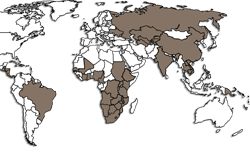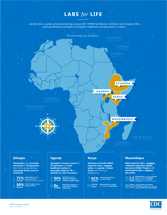Global HIV/AIDS at CDC - Overview
CDC plays a unique role in the fight against global HIV/AIDS

Global HIV/AIDS
Today, an estimated 35 million people worldwide live with HIV/AIDS, with more than two-thirds living in Sub-Saharan Africa. Nearly three-fourths of the 2.1 million new HIV infections in 2013 occurred in these countries.
CDC’s Role
CDC provides support to more than 60 countries (see countries where we work) to strengthen their national HIV/AIDS programs and build sustainable systems through the U.S. President’s Emergency Plan for AIDS Relief (PEPFAR).
Public Health Impact
CDC uses science to save lives and, through PEPFAR, has helped support

As the U.S. science-based public health and disease prevention agency, the Centers for Disease Control and Prevention (CDC) plays an essential role in implementing the U.S. President’s Emergency Plan for AIDS Relief (PEPFAR). PEPFAR is the cornerstone of the U.S. Global Health Initiative.
CDC uses its technical expertise in public health science and long-standing relationships with Ministries of Health across the globe to work side-by-side with countries to build strong national programs and sustainable public health systems that can respond effectively to the global HIV/AIDS epidemic and to other diseases that threaten the health and prosperity of the global community at large.
Ensuring global health strengthens U.S. health, economic, and national security. Improving the health of people in developing countries also impacts the productivity and political stability of those nations. This results in a safer, more prosperous, and secure world community that benefits Americans at home and abroad.
Unmatched scientific and technical expertise
With over 60 years of expertise in epidemiology, surveillance, laboratory systems, and public health services, CDC works with Ministries of Health to strengthen their national HIV/AIDS programs by:
Leveraging CDC’s scientific and technical expertise to conduct research and translate findings into innovative programs and to assist countries in building capacity for data-driven decision making that maximizes disease impact and cost effectiveness.
Establishing and strengthening public health systems and services including high quality laboratories and surveillance systems for rapid detection and response to HIV and other emerging global health threats.
Critical leadership for transitioning sustainable programs to country ownership
CDC works side-by-side with Ministries of Health in 44 countries to build their capacity to lead and manage their national HIV/AIDS programs by:
Providing direct technical assistance and knowledge transfer through long standing relationships with Ministries of Health. This in-country presence has resulted in increased performance, capacity development, country ownership, and public health impact.
Building a trained local workforce through daily mentoring to nearly 1,100 locally employed staff by CDC’s highly trained clinicians, epidemiologists, public health advisors, health scientists, and laboratory scientists. CDC also provides training programs and funding to local educational institutions to establish a pipeline of qualified, well-trained public health professionals.
Labs for Life Infographic:

Get email updates
To receive email updates about this page, enter your email address:
Contact Us:
- Centers for Disease Control and Prevention
1600 Clifton Rd
Atlanta, GA 30333 - 800-CDC-INFO
(800-232-4636)
TTY: (888) 232-6348
24 Hours/Every Day - Contact CDC-INFO
 ShareCompartir
ShareCompartir


